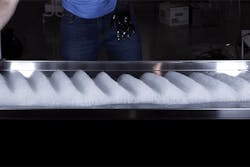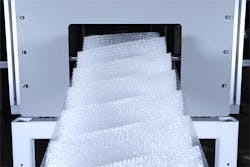There are quite a few players within the blossoming additive manufacturing industry -- so many it can be hard to keep them all straight. However, two and a half year old OPT Industries has a fresh perspective.
Spun out of MIT by founder Jifei Ou, OPT began with a patented 3D printing system built upon years of R&D in additive manufacturing and computational fabrication.
OPT is focused on using 3d printing to produce extremely fine, yet dense, microstructures (25-50 microns) using its patented roll-to-roll based system (much like textile manufacturing) instead of a traditional batch to batch approach.
While Ou's confidence in the technology’s ability to deliver has never wavered, the pandemic allowed the tech startup to truly put its approach to a real world test. Specifically, during the initial stages of the pandemic, OPT received a request from the Beth Israel Hospital for a nasal swab. "It was an opportunity to validate how adaptive our technology could be from the idea or prototype to production," he says. "We created the design within two days, and with two months, we set up the production floor. By the peak of the pandemic, we delivered over 800,000 swaps to health organizations like Kaiser Permanente and Henry Schein."
Ou tells IndustryWeek, rather than trying to sell machines, OPT's focus is to become the 3M of additive where what people actually remember are the innovative products. “We were not only able to serve as a stopgap for a supply chain shortage, but also provide a better product,” he says. “This is where 3d printing can shine. It is not just about prototyping or stop gaps, it has the ability to set new standards. For the swab, OPT is producing a produce that excels well beyond the industry golden standard. It's actually 20 times higher elution on the bacteria side, but also 2X-4X higher elution on the viral load side.
"This will allow us to expand the production throughput and grow the team. We are looking into different product lines to create in addition to the nasal swab. There are so many other application opportunities beyond swabbing from the nose,” he says. “The device is highly customizable to address an entire family of medical and agricultural applications.”
OPT is also actively pursuing opportunities within cosmetics. For instance, developing applicators for products such as mascara or lip cushions. "These are the type of applications where through the design and accurate manufacturer of microstructures, it is possible to take up fluids and then release more effectively than existing applicators,” he says.
Looking forward, Ou sees the bulk of the challenges as industry specific including the need to deal with significant regulatory requirements. “As class one products, swabs have the lowest regulations. As we dig deeper into medical industry opportunities meeting more stringent requirements and getting the FDA clearance will take longer,” he says. “This is why we're working with several FDA consultants to help navigate through the obstacles. The technology itself is ready and scalable.”
About the Author
Peter Fretty
Technology Editor
As a highly experienced journalist, Peter Fretty regularly covers advances in manufacturing, information technology, and software. He has written thousands of feature articles, cover stories, and white papers for an assortment of trade journals, business publications, and consumer magazines.

